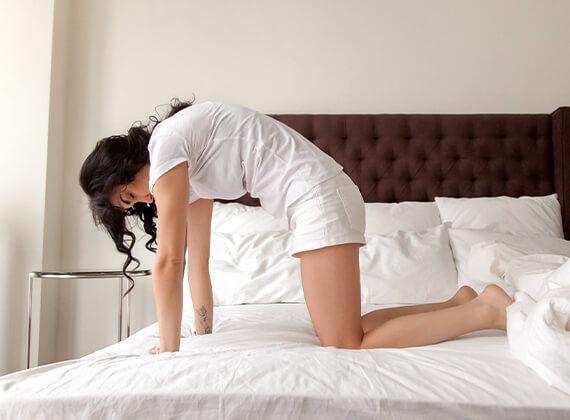In today’s day and age with technology in front of us at every turn and our busy schedules, many of us struggle to calm our mind for a restful sleep.
We spoke with Claire Robbie – meditation teacher, journalist and mama, about her techniques and teachings and how they assist with sleep and easing the mind. Claire’s tips look at daily practises such as meditation, cutting back on technology and focusing on what nourishes your mind, body and soul.
Kristy Von Minden, founder of Mind Bright, shares her neuroscience and psychological insights and recommends implementing simple principles to soothe stress levels and encourage a happier life and mindset.
While Dr Tony Fernando, Insomnia & Sleep specialist, recognises that stress and worry are primary factors that keep people awake at night and recommends some helpful mindful strategies to help deal with these.
Start by trying a few of these suggestions from our resident experts about how to add mindfulness into your day and then slowly incorporate more practices to reap the full benefits.
sleep and mindfulness
Claire Robbie
Rest is exceptionally important for everyone. Look, for example, at creatures in the wild – spending their days resting, playing, then springing into action when they need to. We often spend our days busy and always on-the-go and wondering why we find it hard to relax and sleep properly? As a meditation teacher, I find that many of my students have been drawn to meditation, because they’ve heard it may help them sleep better. The good news is that this is true, however, it requires changing habits, patience and consistency (my favourite word!). Combining high quality rest with clean, nourishing food, movement and hydration – will help enable you to rest, relax and sleep deeply. We don’t need to complicate this. I encourage you to focus on one thing at a time. Once we start making changes, we need to wait for the dust to settle to experience the shifts that these changes can bring.
Here are a few tips to become more mindful of your ‘recharge’ time:
FRESHEN UP
Spring clean your living spaces, especially the area you sleep in. Keep your bed linen dust-free and clean. Take the time to make your bed each day and create an inviting, relaxing space. Make sure your bedroom is well-aired, clean and tidy. A fresh space is a relaxing space.
MINIMISE PHONE TIME
Spending time on your phone, whether working or scrolling, is far from ideal for your brain and your sleep patterns. The detrimental effects that the overuse of smart phones is having on millions of people is well documented. Set time limits and try to stick to them. Try to get off your phone at least two hours before bed and ideally don’t charge your phone in your bedroom.
START SAYING NO
Just like it’s healthy to declutter your room, declutter your life. If certain people, places, activities or foods leave you feeling drained, tired or like you have an ‘energy hangover’, spend less time with these people, at these places, doing these things. Watch how your life opens up. Use the time to find activities that nourish and rejuvenate you – things that speak to your soul.
FOCUS ON ‘REST’, AS WELL AS SLEEP
Once we start saying no to things that drain you, you’ll have more time for things that nourish you. While sleep is important, so are restful, rejuvenating activities. Go out into nature – the ocean, forests and beaches have an alpha frequency that will soothe your soul. Get massages, lie in the sun, read. Join a group that creates something you’re interested in – crafts and hobbies such as painting or gardening guide you into the present moment. Increasing this restorative time during the day, will have a profound effect on your nights.
EARLY TO BED AND EARLY TO RISE
Contrary to many people’s beliefs, there isn’t such a thing as a ‘night owl’. We function better going to bed earlier and rising with the sun, in sync with the natural world. The hours you get in before midnight provide extra restoration. Use your new-found time in the morning to cultivate a grounding ritual, such as gentle stretching, meditation or exercise.
LEARN TO MEDITATE
There are many different types and styles of meditation. Any style of meditation you practice on a daily basis will help you to rest and relax. Why? Because consistent meditation cultivates present moment awareness – ‘mindfulness’. You become more aware and connected to how you feel in each moment and adjust accordingly. My favourite place to meditate is sitting up on my bed each morning before I start my day. I get comfortable and cozy with my meditation blanket and do my first 20-minute session. It’s the perfect buffer from sleep to being fully awake.
sleep and mindfulness
Kirsty Von Minden
Getting a good night’s sleep isn’t just about what you do to wind down in the evening. Researchers have now found that practicing mindfulness throughout the day is linked to an improved ability to detach from a busy day, enhancing both our ability to fall asleep and the quality of our sleep.
So, what exactly is mindfulness? I like to explain it as ‘paying attention, without judgement, to the present moment – your thoughts, senses and environment’. Mindfulness can be practiced anywhere, anytime and the science world is now firmly on board, thanks to its proven health benefits.
Specific to sleep, mindfulness helps calm a busy mind by giving it a break from future thinking, worrying, planning and taking in a constant stream of information. Being mindful moves us from a place of ‘fight or flight’ to ‘rest and digest’, which our brains need to invite sleep. Our nervous system is like a pair of scales and needs to be balanced, little and often, throughout the day. This balancing means we don’t get stuck in the ‘fight or flight’ position, preventing us from falling asleep, something which people are struggling with more and more due to the pace and constant connectivity of modern life.
Getting enough sleep is one of the most important things we can do for our health, so if you’d like to incorporate more mindfulness into your daily routine, here are some ideas that I practice regularly:
MINDFUL BREATHING
I practice 15 slow, deep belly breaths from the comfort of my bed as soon as I wake up. I pop my hands on my tummy and focus on the rise and fall, which really helps keep me focused. If your mind drifts off, just return to the count of one. Diaphragmatic breathing sends a signal to our brain that we are safe and sets us up for a calm day.
A MINDFUL CUPPA OR LUNCH
I try to make all of my tea and lunch breaks mindful – this means I really slow down and focus on what I’m eating or drinking. The taste, smell, temperature, colours and textures. Most importantly, I make sure I put my phone away when I’m doing this, so I can be fully present.
DO THINGS SLOWLY
I think we all find it easy to get caught up in the rush these days, doing things quickly even when we don’t need to. But this can send a signal to our brain that we are running from danger, sending us into ‘fight or flight’. Nowadays I resist the urge to rush, especially in the morning, and move slowly and mindfully, even if it means getting up a little earlier.
MINDFUL WALKING
I take a walk every day and always take this time to engage all of my senses and fully appreciate nature. I focus on the colour of the trees and sky, the sound of the birds, the smell of fresh air and the feel of leaves under my feet and sun or wind on my skin – it’s amazing how little we actually get to slow down and be mindful of our senses amongst our busy lives. Taking time to be mindful in nature is so calming for our nervous system.
A GUIDED MEDITATION
The last thing I do when I crawl into bed is a guided body scan meditation. I relax each body part one at a time, from the top of my head to the tips of my toes, really focusing on how comfortable my body feels sinking into my mattress. Try an app like Head Space or Calm to help get you started. At the end of the day, giving your body and mind a break is crucial for you to function properly. If you have an overwrought nervous system, you will find it hard to relax, even at bedtime. Give yourself a break, try incorporating some of the above into your routine and watch your sleep quality improve. If your lifestyle means that you’re often tired, stressed or overwhelmed and “don’t have enough time” to take care of yourself, then potentially something needs to change. Sometimes we have to slow down, in order to speed up.
sleep and mindfulness
Dr Tony Fernando
Stress and very busy minds are two of the top causes to keep us awake at night. Many people worry about work, money, family, health, relationships, what they have said earlier in the day, what people might think of them. A couple of big worries are “I’m not sleeping …” and “how will I function tomorrow if I don’t get enough sleep tonight?”. Interestingly, quite often, the more one obsesses about sleep, the less sleep one gets. When one goes to bed stressed, the mind remains awake and vigilant, as it tries to solve worries. Unfortunately, solutions are commonly not often found in the middle of the night and the mind just keeps on churning, moving from one topic to the next, keeping you awake. The mind can be known to ruminate endlessly when lying in bed. However, there are ways to help combat stress and enhance your night’s sleep, such as:
- Getting out of bed and making a list of what worries you and then coming up with solutions the following morning to help.
- Or, instead of writing a list of worries, writing a gratitude journal, as it can neutralise the worrying and shifts the focus on to the good in one’s life.
- For others, listening to soft music or slightly inaudible talk-back can help distract from worries.
Mindfulness techniques can also be helpful. First, it is important to acknowledge the worrying process as normal, saying to oneself “it’s normal to worry”, instead of focusing on the details of the worry. Then, shifting the attention to the sensation of the breath, noticing breath coming in and out – letting one’s breathing do its job and not interfering with it. When the worrying comes back, just acknowledge calmly and say, “it’s normal to worry”, smile and focus back on your breathing. Doing this exercise allows you to get out of the “worry factory”, by paying attention to something calming and soothing (like the breath). If this is too much to remember, just download some helpful mindfulness APPS like Headspace or Smiling Mind. Sometimes, the worrying circuit kicks in because you go to bed earlier than your body naturally wants. Many insomnia sufferers are fixated in getting the “magic number” of 8 hours of sleep, without realising that they might need less than that? Even though the average sleep requirement for adults is around 8 hours, many sleep well and function wonderfully with 6 or 7 hours of sleep, as long as it is deep and mostly uninterrupted. When one goes to bed sleepy, the brain does not have the energy to worry.
You may also like ...
Morning rituals can help improve your day, boost your overall well-being and enhance the quality of your sleep.
Try these simple stretches, movements and positions to help get a good night’s sleep.
Find out how to incorporate music into your night-time routine, to help wind-down before bed.




